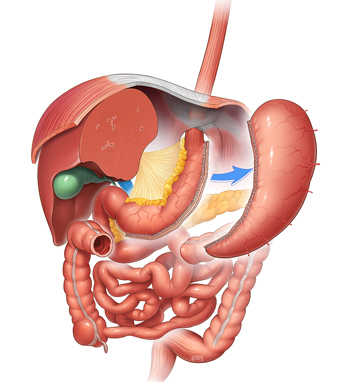Sleeve Gastrectomy
Sleeve Gastrectomy has been our most popular procedure for over 10 years. We find it to be safe, effective and reliable for the majority of patients.
How does a Sleeve Gastrectomy work?
Studies suggest that a sleeve gastrectomy works in several ways. The pressure inside a long and thin stomach is slightly greater than an ordinary stomach and this slight increase in pressure is enough for the signals to suppress hunger. It also induces hormonal changes primarily by causing food and liquid to quickly empty out the stomach and into the intestinal tract. Receptors in the intestines then send a feedback signal to the stomach to alter its contractions and simultaneously to the brain to indicate that no more food should be consumed. Even though your stomach is not physically full, the signals are telling you that you don’t need to eat any more.
This effect lasts a long time, but if you try to eat more food 5 or 10 minutes later, generally you will be able to do so. So, for weight loss to be successful you need to listen to the signals saying you are content and bin any food remaining at that point so you are not tempted to eat more. If you ignore those signals and put more food in, the stomach will try and accommodate by dilating. The pressure then drops and slowly you will get more and more hunger pangs returning along with fewer and fewer signals for early satiety and hormonal changes as the speed of emptying slows down.
Sleeve Gastrectomy

"However, the surgery can’t subvert your will. For example, you may choose to liquidise your food and take in more calories that way. Or you may eat small portions more often or eat high density foods. Surgery can not prevent the consumption of excess calories, only you can do this. The sleeve gastrectomy is a powerful tool you can use to facilitate the calorie reduction and subsequent weight loss and resolution of co morbidities."
What are the advantages of a sleeve gastrectomy?
Sleeve gastrectomy is the most popular procedure for weight loss at Upper GI West and world wide for that matter.
There are many advantages to a sleeve gastrectomy. Perhaps the most obvious is the significant and sustained weight loss possible for patients who are obese or morbidly obese. On average patients loose 60 to 70 percent excess weight loss a year after surgery. However, you should not assume this weight loss will occur simply because you have had surgery.
Surgery does not cause weight loss per se, it merely causes advantageous hormonal, receptor, motility, energy expenditure and sensory changes that facilitate weight loss. It is by taking advantage of these changes and reducing calorie input that weight loss occurs.
A sleeve gastrectomy is normally performed by laparoscopic (keyhole) surgery and has several additional advantages, including:
- A short procedure of about 1 ½ hours and just 2 to 3 days in hospital
- Significantly safer than bypass surgery
- More effective and better tolerated than gastric banding
- Reliable if a sensible diet is followed
"Most sleeve gastrectomies can be performed in about one and a quarter to one and a half hours. Occasionally the procedure can be performed in less time. Sometimes, it takes twice as long or, on rare occasions, longer still. An operation should take as long as it needs.
At Upper GI West, we believe that time and care are essential for accurate surgical performance. For any bariatric operation to work it needs to be created accurately. Pouches need to be uniform and without odd angles or twists so they empty as they should and have optimal effect. Bulges at the top end of the stomach have to be avoided.
That is is why we don’t perform more than five sleeve gastrectomies on a whole day operating list. Your surgeon will only concentrate on you and will be available until you have fully recovered before he begins another surgery. None of the Upper GI West surgeons believe in having parallel lists where one patient is still on the operating table whilst the surgeon leaves and starts operating in another theatre. We simply do not believe this is conducive to good surgery and good outcomes."
How much weight will I lose?
Surgery is scientifically proven to be by far the most effective way to achieve sustained weight loss in morbidly obese patients. In fact in the vast majority of obese individuals it is the only effective way to attain significant sustained weight loss. This is because of the hormonal, and receptor changes caused by surgery as well as the energy expenditure changes and sensory changes brought about from surgery.
It is fundamentally different from just dieting. However, on its own having surgery doesn’t guarantee success. You will still need to maintain a healthy dietary lifestyle to achieve optimal results.
There’s no magic formula, but individuals who have had gastric sleeve surgery have been shown to lose on average, 60-70% of their excess body weight. However the surgery does not cause the weight loss - you do! When looking at averages you need to understand that by definition there will be some people who have lost less weight than this average, whilst others will have lost more. Also be aware of data and its interpretation; for instance two individuals, one 100KG overweight and another 50KG overweight may loose 50KG each but one will have lost 50% excess body weight whilst the other a 100% excess body weight but the health benefit to both is the same, ie their total weight lost. What’s most important is the absolute benefit to your health by safe and sustained weight loss.
Before gastric sleeve surgery, you may have battled with health problems such as diabetes. We know that obesity can lead to heart disease, stroke, depression and even cancer. Your diet after bariatric surgery will be crucial to ensuring a successful outcome.
The good news is gastric sleeve surgery will reduce or eliminate your hunger and will alter favourably how your body controls energy balance. This will make it easier for you to achieve good results after your weight loss procedure.
Will weight loss slow down or can you lose too much weight?
The speed of losing weight will decrease eventually. This is because the energy expended by a heavier individual is greater than a lighter individual. As weight is lost the actual energy expended also reduces. Therefore, the difference between output and input reduces and the rate of weight loss similarly slows down.
It is highly unlikely you will lose too much weight unless there are significant complications from the surgery. It is easy to eat more than 800 calories if you put your mind to it. You can stop weight loss by consuming more calories. In very rare situations, food intolerances, dietary insufficiencies and psychological issues can lead to excessive weight loss. When these need addressing we will often use additional resources and engage other specialists.
"We often get asked, how much weight can I expect to lose after this procedure. The average is often stated at 60 to 70 percent weight loss after bariatric surgery. However, these figures are merely a guide. Surgery has profound hormonal and metabolic effects but it can not prevent the consumption of calories. It can not lead to weight loss on its own. The only effective way to lose weight after surgery is radical calorie restriction.
Sleeve gastrectomy is a powerful tool and helps by giving you a strong set of signals to not consume too much. If you listen to the signals and stick to fewer than 800 calories a day, you should continue to lose significant weight. However, you are human and you will still have the capacity to overcome the powerful effects of surgery by liquidising food, constantly eating or consuming high density food products"
What is the difference between a sleeve gastrectomy when compared to other types of bariatric surgery?
It is the simplest and safest resectional procedure. The natural pathway of food through the intestine is kept intact. This allows endoscopic access to all the gi tract post surgery as could be accessed pre surgery. This is especially relevant for accessing the biliary system in case of gall stones and biliary tract stones. There are no spaces for internal hernias to occur as opposed to all the bypass procedures.
Anti-inflammatory tablets (NSAID’s) can be consumed 2 weeks after surgery but should be avoided lifelong in the bypass patients. All other bariatric procedures can be performed from a sleeve gastrectomy if required. The sleeve is thus the most versatile primary procedure. Lower levels of vitamin and mineral deficiencies occur with a sleeve than other bariatric procedures. Absorption of medications is more predictable following a sleeve than any bypass.
What’s the complication rate?
"If you are a smoker, you will need to quit at least three months before obesity surgery. That is because smoking considerably increases the risks of the anaesthetic and a leak. In fact it doubles your risk of leaking and halves your chance of early resolution.
Leaks from sleeve gastrectomies and other bariatric procedures can involve multiple operations and interventions including major abdominal incisions with prolonged stays in hospital. These complications need to be avoided as much as possible. Leaks can be life ruining and life threatening. We pride ourselves in providing safe surgery with minimal complications but you have to do your bit too!"
About 10-20% of individuals will suffer heartburn that requires the use of medication in the months after the procedure. Some of this is due to a slightly higher pressure being in the long thin stomach than the ordinary baggy stomach. Some of it is due to hiatal hernias that may develop as weight is lost, or the development of laxity around the junction between the stomach and oesophagus as surrounding fat disappears.
Sometimes medications or hiatal repair do not control reflux symptoms. In that case conversion to Roux-en-Y bypass may be the only option. Your upper GI West surgeon will be able to perform this procedure if required.
"Whatever the cause of heartburn most cases are controlled on medication. Occasionally hiatal hernia repairs are required. If a hiatal hernia repair is required you can be assured that the surgery can and will be performed by your Upper GI West surgeon who has undergone specific subspeciality training and accreditation in this type of surgery. You will not receive any additional gap payment from your Upper GI West surgeon for the management of your hiatal hernia or any other associated complications from your surgery"
Do we use a minimiser ring?
Some Surgeons are advocating placing a minimiser ring around the sleeve which looks a bit like a cable tie. This practice comes from banded gastric bypass where the ring is thought to prevent dilatation of the small intestine from where it has been joined to the stomach. This is very different to a sleeve gastrectomy.
There is now some published evidence that banded sleeve gastrectomy may increase weight loss and decrease the risk of weight regain. However placing a ring around the top of the sleeve can cause obstructive symptoms much like adjustable gastric banding resulting in difficulty swallowing and food intolerance. It can cause dilatation of the top of the sleeve which we consider to be the most critical part. It may also increase the risk of reflux, volume regurgitation and possible aspiration.
At Upper GI West we therefore do not recommend routinely placing a ring or band around a gastric sleeve. We will discuss all the potential surgical options including more powerful bariatric and metabolic procedures and a staged approach over the longer term.
"What a ring or band can do is damage the nerves that run along the stomach. They will cause significant scarring making further surgery more difficult or impossible to perform adequately. A ring or band can also increase vomiting and proximal dilation of the stomach."
The Upper GI West way.
You deserve to feel good about your body, your appearance, and more importantly your overall health. If you have been struggling with obesity and its associated problems, you deserve the most advanced surgical care and expertise.
At Upper GI West, we have brought together some of Perth’s most experienced bariatric surgeons. We have performed the entire range of bariatric procedures. We want you to benefit from our extensive experience and from our multi-disciplinary approach. Your bariatric surgeon will work with our practice’s bariatric physician and dietician to ensure you receive personalised care throughout your journey.
Speak to our friendly team and we will do everything we can to support you and help you prepare for your treatment and on your continued battle with your weight and metabolic issues whichever pathway you take.
"At Upper GI West, we recognise obesity is a disease process. We recognise the metabolic consequences of obesity and that these must be managed lifelong. This process is not about short to medium-term weight loss. It’s about helping you to stay healthy long-term and throughout your life."




